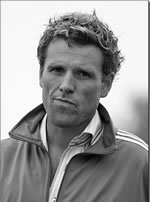Chiswick Olympian James Cracknell was 'saved by his cycling helmet'
|
Speaking for the first time since her husband’s accident which left him with a fractured skull, Beverley Turner told The Telegraph how she walked into the intensive care unit “and saw her husband, adventurer and Olympic rowing champion James Cracknell breathing with the aid of a ventilator, wired up to bleeping monitors, multiple drips in his arm, her stomach lurched and went into freefall.”
Turner, who lives in Chiswick with Cracknell and their two children, writes for The Telegraph. She said, “Ironically I’d spent years worrying that James would come a cropper in a reckless, extreme adventure and plunge down an icy crevasse in some remote wilderness, but it was a road traffic accident in the United States that had left him with a fractured skull and damage to his brain. It’s the sort of thing that could have happened to any of us, anywhere.”
The double gold medal-winning rower was riding his bicycle along an Arizona road trying to break an endurance record whilst being filmed by Discovery Channel. He suffered a fractured skull and bruising to the brain when a truck hit him from behind.
“The doctors say his cycling helmet – which was shorn in two with the impact – saved his life and that it was a miracle he didn’t fracture his spine or any other bone, although the bruising is horrendous.”
Thanks to his extraordinary fitness levels, he was able to come off the ventilator after a day and leave the intensive care unit within three days for the neuro-trauma recovery ward. Although progress is painfully slow, the consultants say there’s no reason why he shouldn’t make a complete recovery – in time.
“We don’t know what timescale that will be, but within three to six months he should appear to be himself. Only those closest to him may be able to discern a subtle difference,” says Turner.
The full interview published in The Telegraph can be found here.
July 27, 2010
